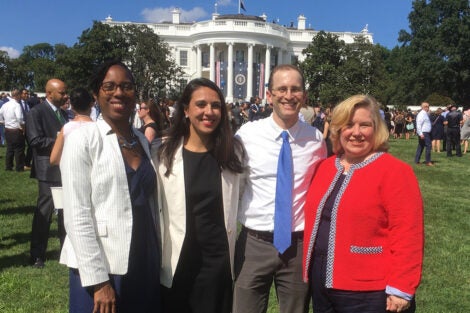October 3, 2023 — Physician and health economist Benjamin Sommers spent two years on leave from Harvard T.H. Chan School of Public Health to serve in the U.S. Department of Health and Human Services (HHS). During a September 27 seminar for the Department of Health Policy and Management, he reflected on research he conducted while in this role, and the rewards and challenges of public service.
Sommers is the Huntley Quelch Professor of Health Care Economics at Harvard Chan School, and professor of medicine at Harvard Medical School. In January 2021, he was appointed by President Biden as the deputy assistant secretary for health policy in the Office of the Assistant Secretary for Planning and Evaluation (ASPE) and served in that role until early 2023. In 2022, he was also appointed to lead ASPE as the senior official performing the duties of the assistant secretary.
ASPE is the think tank generating evidence for the secretary of HHS, Sommers said. It includes four policy offices covering a wide range of topics including Medicare, the health care workforce, and regulation of medications.
“Our job was to help clarify what we know about the potential implications of policy choices,” Sommers said. “Ultimately, the goal is to help support the decisions the secretary makes to implement the President’s agenda.”
Sommers said that he was grateful to have been appointed at the start of the Biden administration, when Democrats had control of Congress and there was more opportunity to play a role in setting ASPE’s priorities. During that time, ASPE provided technical support for a flurry of health-related legislation, Sommers said. When Republicans won control of the House of Representatives following the midterm elections, the focus in Sommers’ office turned to areas that didn’t require Congressional approval.
Supporting implementation of the COVID-19 vaccine rollout was a big part of Sommers’ early months on the job. As an academic, he was surprised at how quickly he was able to get data to support his office’s work on vaccine hesitancy. “We essentially went from a brainstorming session to a very specific question on the census getting approved by the White House and then actually out in the field, to three months later, having data back from tens of thousands of people who answered it,” he said.
This research helped guide government outreach efforts by identifying areas with larger numbers of people in the so-called “movable middle” who might be persuaded to get the vaccine. Another research report led by Sommers shaped outreach efforts to health care providers around prescribing the COVID treatment Paxlovid.
Beyond COVID, Sommers’ other priorities were health equity and coverage expansion. ASPE’s work in these areas included a series of reports about coverage for marginalized populations.
A highlight of Sommer’s time in government, he said, was the day in April 2022 when former President Obama returned to the White House for an event marking the anniversary of the Affordable Care Act (ACA) and moves by the administration to make coverage under the ACA more affordable for families. Sommers was proud that the nation’s uninsured rate hit an all-time low that year. Making the day even better for Sommers: A White House staffer at the event said to him, “I just want you to know that I have like 45 ASPE reports bookmarked on my computer.”
Photo: Courtesy of Benjamin Sommers
